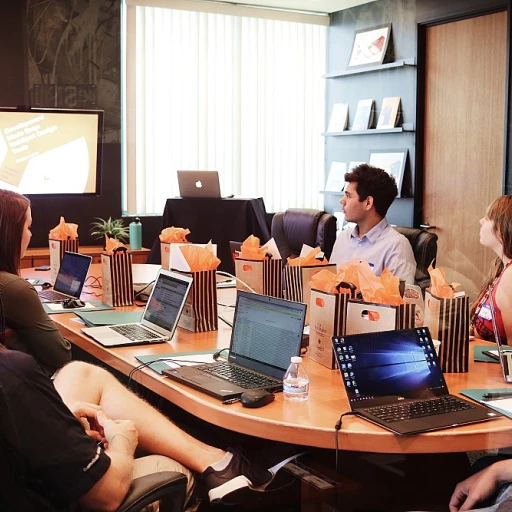Why Continuous Learning Matters
The Importance of Evolving Knowledge
In today's rapidly changing world, continuous learning is no longer a choice but a necessity. The importance of evolving knowledge is paramount as industries, technologies, and even cultural landscapes shift at lightning speed. This dynamic environment demands individuals and organizations to stay ahead by constantly updating their skillsets and knowledge base.
Engaging in continuous learning allows employees to remain relevant in their fields, contribute innovatively, and be agile in the face of change. For organizations, fostering a learning culture enhances productivity, boosts employee satisfaction, and leads to a competitive edge in the marketplace.
The significance of this never-ending educational journey can't be understated. It's about more than just accumulating knowledge; it's about cultivating a mindset that embraces curiosity and adaptability. To fully appreciate why continuous learning matters, delve deeper into how this practice can revolutionize both personal and professional landscapes
here.
Understanding the profound impact of continuous learning sets the stage for appreciating its numerous benefits, such as enhanced skills and knowledge acquisition, as well as the newfound opportunities for personal and professional growth that arise. This comprehensive approach ensures that both individuals and organizations thrive in a world where change is the only constant.
The Benefits for Employees and Organizations
Advantages for Individuals and Companies
Continuous learning offers a myriad of advantages for both employees and organizations. In an ever-changing professional landscape, the ability to learn and adapt is crucial for success.
For employees, continuous learning fosters personal and professional development. It empowers them to be more agile in their roles, adapt to new technologies, and stay competitive in the job market. By enhancing their skills, employees can open doors to new opportunities, promotions, and even career shifts that align more closely with their passions and strengths.
Organizations benefit greatly from investing in continuous learning initiatives. A well-trained workforce is more innovative, efficient, and effective. Employees who are encouraged to grow and learn are often more engaged and motivated, leading to higher productivity levels and job satisfaction. This is crucial in reducing turnover rates and retaining top talent.
Moreover, organizations that prioritize lifelong learning are better equipped to tackle the challenges presented by rapid technological advancements and market changes. By fostering a culture that values learning, companies can create an environment that encourages creativity and problem-solving.
Emphasizing continuous learning in the workplace not only boosts individual knowledge but also strengthens the organization as a whole. For a deeper understanding of this transformative approach, explore the
power of lifelong learning.
Boosting Skills and Knowledge
Enhancing Competencies and Expertise
Continuous learning brings forth an effective strategy to elevate one's skills and knowledge base. In today's ever-evolving world, professionals are required to adapt to new technologies, methodologies, and industry standards. By engaging in continuous learning, employees are better equipped to handle these changes, enabling them to tackle new challenges and responsibilities with confidence.
This constant enhancement not only empowers individuals but also strengthens the organization as a whole. An adaptable workforce is essential for businesses to stay competitive in their respective markets. Moreover, by promoting continuous learning within the organization, companies foster innovation, which can lead to the development of groundbreaking products and solutions.
Additionally, progressing in skills and knowledge allows employees to gain a deeper understanding of their roles and the industry they are operating in. This deeper understanding often leads to improved job performance and productivity. It also enhances job satisfaction, as employees feel more competent and fulfilled in their roles.
Continuous learning is not merely about keeping up to date with current trends; it's about expanding one's horizons and exploring innovative ways to enhance personal and professional capabilities. Embracing this mindset can lead to significant opportunities for personal development, as further explained in other sections. In the journey of advancing skills and expertise, continuous learning acts as a catalyst, ensuring that both employees and organizations are not only prepared for the future but are actively shaping it.
Opportunities for Personal and Professional Growth
The Path to Personal Fulfillment and Professional Success
Embarking on the journey of continuous learning opens up a world of opportunities for both personal and professional development. As individuals engage in this lifelong pursuit, they unlock the potential to reach new heights, both within and outside their careers.
In terms of personal growth, continuous learning allows individuals to enrich their lives by broadening their perspectives, deepening their understanding of diverse topics, and fostering the development of critical skills. As people immerse themselves in new subjects and experiences, they gain a greater sense of self-awareness and self-confidence, enabling them to navigate life’s challenges more effectively.
On the professional front, the importance of continuous learning cannot be overstated. Employees who commit to expanding their skills tend to be more adaptable and innovative, qualities that are highly valued in today’s dynamic job market. By staying abreast of industry trends and acquiring new competencies, these learners increase their employability and potential for career advancement.
Organizations also benefit tremendously when they encourage a culture of continuous learning among their workforce. Employees who are continually learning are more engaged, motivated, and equipped to contribute to their companies’ success. As such, promoting a learning-centric environment is a win-win strategy for both the individuals and the organizations they are part of.
Ultimately, the journey of continuous learning is both empowering and transformative. By embracing this mindset, individuals not only realize personal fulfillment but also significantly enhance their professional trajectories, positioning themselves for greater success and recognition in their respective fields. This path, albeit challenging, is one of the most rewarding ventures a person can embark upon in their lifetime.
Embracing E-Learning for a Seamless Experience
The digital revolution has transformed many aspects of our daily lives, and education is no exception. One of the most significant changes is the rise of online learning platforms, which have become indispensable in facilitating lifelong learning. These platforms offer unparalleled flexibility, making it possible for individuals to access a world of knowledge anytime, anywhere, and on any device.
Online platforms democratize education by removing geographical barriers and offering courses from prestigious universities and experts in various fields. This allows learners from all corners of the globe to upskill and reskill, tailoring their educational journey to their personal and professional goals. Whether it's mastering a new language, delving into coding, or honing soft skills like communication and leadership, there's a wealth of resources available at the click of a button.
Additionally, the adaptability of these platforms means they cater to different learning styles. From video lectures and interactive quizzes to virtual labs and peer collaboration, the variety of formats ensures that every learner can find engaging content that suits their preferences. This customization is crucial in maintaining motivation and fostering a sense of agency over one's learning journey.
Furthermore, online learning platforms often offer opportunities for learners to connect with peers and mentors worldwide. These interactions can lead to invaluable networking opportunities, potential collaborations, and a sense of community. Such connections are instrumental in driving personal and professional growth, reinforcing the importance of continuous learning as discussed earlier.
In a world where change is constant, online learning platforms provide the tools necessary for adapting and thriving. Businesses and individuals alike can harness the power of these platforms to foster a culture of lifelong learning, enabling them to remain competitive and resilient amidst ever-evolving challenges.
Creating a Culture of Continuous Learning
Fostering an Environment that Embraces Learning
Creating a culture of continuous learning within an organization is essential for both personal and professional development. This culture encourages employees to actively engage in learning opportunities, which can lead to increased job satisfaction and better performance. It also helps organizations remain competitive in a rapidly changing world by ensuring their workforce is equipped with the latest skills and knowledge.
One of the key elements in fostering such an environment is leadership commitment. Leaders must not only advocate for continuous learning but also model it themselves. When employees see their leaders participating in learning activities, it sends a powerful message about the value placed on personal growth and development.
Additionally, providing accessible resources and opportunities for learning is crucial. This includes offering workshops, seminars, and access to online learning platforms, as discussed earlier. By making these resources readily available, organizations can encourage employees to take ownership of their learning journey.
Moreover, recognizing and rewarding learning achievements can further promote a culture of continuous learning. Celebrating milestones and accomplishments can motivate employees to pursue further education and skill development, reinforcing the organization's commitment to growth.
Lastly, fostering open communication and feedback is vital. Encouraging employees to share their learning experiences and insights can create a collaborative environment where knowledge is freely exchanged, benefiting the entire organization. This approach not only enhances individual growth but also contributes to the collective intelligence of the team.
In conclusion, by embedding continuous learning into the organizational culture, businesses can unlock new potential and drive innovation. This investment in learning not only benefits employees but also positions the organization for long-term success.





